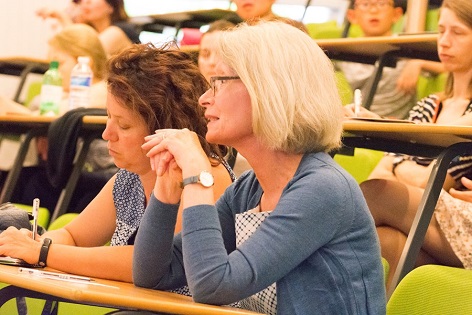DATE: 18 June 2018
TIME: 9.00-17.00
LOCATION: Psychology Building G79, University of Reading, Earley gate entrance
Course Instructor: Dr Stefan Th. Gries
 This 30-hours/1-week course introduces participants to regression modeling with the open source programming language R. Assuming as prerequisites a basic understanding of the logic of statistical analysis and testing, it provides a thorough discussion of many aspects of statistical analysis up to and including (generalized) linear (mixed-effects) regression modeling. Specifically, on the basis of data from both experimental and observational studies – both real and sampled/simulated – the course discusses different theoretical considerations of regression analysis, model selection processes, and model diagnostics. Particular emphasis will be placed on the interpretation of the numeric output of regression modeling as well as the visual representation of (fixed-effects) main effects and interactions and (random-effects) varying slopes and interactions.
This 30-hours/1-week course introduces participants to regression modeling with the open source programming language R. Assuming as prerequisites a basic understanding of the logic of statistical analysis and testing, it provides a thorough discussion of many aspects of statistical analysis up to and including (generalized) linear (mixed-effects) regression modeling. Specifically, on the basis of data from both experimental and observational studies – both real and sampled/simulated – the course discusses different theoretical considerations of regression analysis, model selection processes, and model diagnostics. Particular emphasis will be placed on the interpretation of the numeric output of regression modeling as well as the visual representation of (fixed-effects) main effects and interactions and (random-effects) varying slopes and interactions.
Time permitting, we will discuss additional more advanced aspects such as fitting with curvature, planned/a priori contrasts, and other methods.
In addition to the regression modeling part, there will be a section on an increasingly widely used modeling tool, classification/regression and conditional inference trees. That section will discuss basics of such tree-based algorithms as well as its advantages and disadvantages.
I will provide code and data and there will be practice sessions in which participants can apply the above methods to small data sets under supervision.
Requirements:
Participants should bring their own laptop and should have installed R and RStudio beforehand. Download R to your computer here [https://cran.r-project.org/]. Download RStudio to your computer here [https://www.rstudio.com/products/rstudio/download/] – RStudio is an optional but highly recommended graphical user interface for R
Participants will need to have current versions of R and RStudio installed on their laptop; information regarding required packages will be provided to participants closer to the workshop date;
Participants should be familiar with statistics and R equivalent to chapters 1-3 of Gries (2013, _Statistics for linguistics with R_, 2nd ed.).
Course content:
Elementary data structures and manipulation; simple descriptive statistics and visualization
linear regression modeling & binary logistic regression modeling (fixed effects only):
numerical interpretation of coefficients and visualization methods
detailed discussion of interaction effects
model selection: direction and criteria
fundamentals of model diagnostics
(generalized) linear mixed-effects modeling with numeric and binary dependent variables:
varying intercepts and slopes
model selection: sequencing and criteria
model interpretation and posthoc exploration (fixed _and_ random effects)
alternatives to regression modeling such as conditional inference trees
practice sessions
The course is intended for linguists who already have a basic knowledge in statistics and some experience using R, and wish to improve their proficiency in statistical analysis of linguistic data.
The content of the bootcamp is based on Gries, S. Th. (2013) Statistics for Linguistics with R (2nd edition). Berlin: Mouton de Gruyter. The first three chapters of the book deal with the basics in statistics and R; they are required reading for successful participation in the bootcamp.
Software used
Participants should bring their own laptop and should have installed R and RStudio beforehand.
Download R to your computer here [https://cran.r-project.org/]
Download RStudio to your computer here [https://www.rstudio.com/products/rstudio/download/] – RStudio is an optional but highly recommended graphical user interface for R.
Places are only confirmed once the payment is processed and the registered guest receives a ticket receipt.
Course costs
Concessions (Staff and students from the UoR)
Cost
£100.00
Standard rate (Participants from outside the UoR)
Cost
£350.00
Coffees/teas provided but participants should bring their own lunch.
For further details and how to book please visit our conference and events pages


